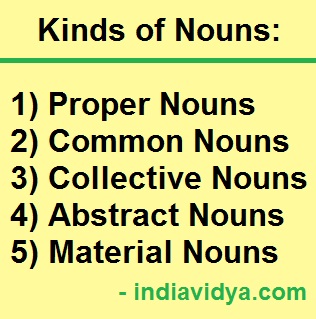Parts Of Speech: Parts of Speech are nothing but different kinds of words in English. There are about one million words in the language today and all these words, depending on the roles they play in a sentence, can be divided into eight groups. They are Nouns, Pronouns, Verbs, Adverbs, Adjectives, Prepositions, Conjunctions, and Interjections. Let us talk about Nouns in a nutshell.
Nouns:
What is a Noun? The word Noun is from the Latin word,”Nomen” meaning ‘Name’. So a noun is a ‘word used for the name of a person,
place and a thing’. Here ‘Thing’ means visible items like gold, silver, and wood, and invisible items like, anger, hunger, love, and wisdom. In the following examples:
1) Balu is a great singer.
2) Bengaluru is a beautiful city.
Here Balu, singer, Bengaluru and city are nouns. Since there are many thousands of nouns, experts have divided them into Five groups and they have some striking and distinctive features.

Proper Nouns:
It is a noun used for the name of a particular person, place, or a thing. In the above examples both Balu and Bengaluru are proper nouns.
Features:
1) They usually begin with a capital letter. For example Modi, Prasad, London, Mumbai.
2) We do not generally use Articles with them (Except in some special cases).
Common Nouns:
It is a noun used in general or commonly. We can use them to anybody without any restrictions. For example in place of Balu, we
can say ‘Suneetha is a singer or Geethamadhuri is a singer’ Therefore they are called Common Nouns.
Features:
1) Most of Them have both singular and plural forms. For example, boy – boys, book – books, teacher – teachers.
2) We as a rule use Articles with them (except in some special cases).
Collective Nouns:
It is a noun used for a group of persons and a collection of things. For example in the sentence ‘The class is studying grammar’, the word “class” stands for a group of students.
Features:
1) Most of them have both singular and plural forms. For example team – teams, army – armies, pack – packs, family – families.
2) We use Articles with them (except in some special cases).
Abstract Nouns
These are nouns used for our ideas, thoughts, feelings and stages in our life. For example Anger, Hunger, Love, and Knowledge, Childhood, Motherhood, English and Physics. are Abstract nouns. As these nouns stand for ‘Shapeless’ or ‘Formless’ things, we call them “Abstract Nouns”. As the word Motherhood is ‘drawn’ from the common noun, Mother, and the word Childhood is ‘taken’ from the common noun Child, they are called “Abstract” Nouns.
Features:
1) Most of them have only one form. (in journalism some use words like ‘deaths’, ‘moneys’, ‘hungers’).
2) We do not usually use Articles with them (except in some special cases when talking about a particular situation like ‘The health of
the CM is improving’).
Material Nouns
Nouns used for the names of materials are Material Nouns. Gold, Silver, Iron, Copper, and Sugar. Since these materials have a shape and form, we can call them “Concrete Nouns”.
Features:
1) Most of them have only one form.
2) We do not use Articles with them (except in some special cases like in comparisons – ‘The Iron of India is superior to the Iron of
Japan’)
Note: For some grammarians, Nouns are of just two kinds – Concrete Nouns and Abstract Nouns. They put Proper Nouns, Common Nouns, Collective Nouns, and Material Nouns under the ‘Concrete Nouns’ category. In many Competitive exams questions on Nouns often appear. Here are a few examples:
1. Mohan (1)/ always gives me (2)/ some good (3)/ advices (4)/. No error (5).
(Answer 4 as Advice has no plural form)
2. This (1)/ chair (2)/ is made (3)/ of the Iron (4)/ No error (5).
(Answer 4 as no Article is used before a material noun when used in a general sense).
3. My son (1)/ has learnt (2)/ alphabets (3)/ very easily (4)/ No error (5).
(Answer 3 as ‘alphabet’ is used in singular to mean ‘English letters’)
Countable Nouns:
Nouns which have both singular and plural forms are Countable Nouns. Most of our Common Nouns and Collective Nouns are Countable Nouns.
Uncountable Nouns:
Nouns which cannot be counted as 1, 2, 3, are Uncountable Nouns. Most of our Abstract Nouns, and Material Nouns come under this group.
Some Special Points:
1) Some nouns are always plural: Trousers, shorts, ashes, tidings, riches, alms, proceeds, spectacles, scales, annals, stairs, customs, and wages. They usually take a plural verb except words like ‘wages’- “The wages of sin is death” (The Bible). It also
takes a plural verb some times like in the sentence,’Their wages are paid in full’.
2) Some Nouns are always Singular: information, luggage, money, fun, health, luck, staff, poetry, paper, stationery, harm, rubbish, pollution, leisure, conduct.
3) Some Nouns are Plural in form but Singular in meaning: innings, civics, linguistics, news, gallows. and subjects like physics, economics, mathematics.
4) Some Nouns are Singular in form but Plural in meaning: police, infantry, alphabet, cattle, poultry, peasantry, clergy.
5) Some Nouns have only one form but we can use them both as Singular and Plural: head quarters, deer, sheep, means, species, yolk.
A thorough knowledge of nouns helps you a lot in many ways and especially it helps you understand other Parts of Speech easily. And using just nouns, you can write powerful, and excellent sentences. Here are some such sentences:
“I have nothing to offer but blood, toil, tears, and sweat” – Winston Churchill
“Friends, Romans, countrymen, lend me your ears; I come to bury Caesar, not to praise him” – Shakespeare
“The only thing we have to fear is fear itself” – Shakespeare
“Surely goodness and mercy shall follow me all the days of my life” – The Bible
“When beggars die there are no comets seen; The heavens themselves blaze forth the death of princes” – Shakespeare